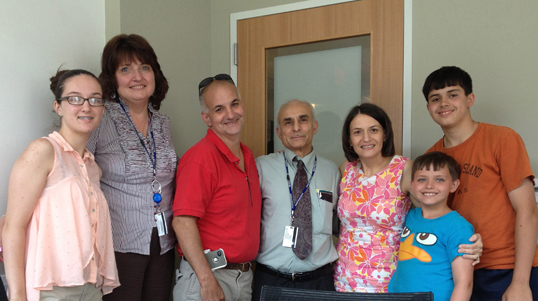
Patients as educators Mike Walsh (third from left) and Beth Walsh Lambert (third from right) are pictured here with (from left) Mike’s daughter Shannon, Assistant Professor of Nursing and Medicine Jean Boucher, PhD, Omanand Koul, and Beth’s sons Matthew and Paul.
People with serious medical issues can offer health care providers-in-training rich insights into the patient perspective.
Siblings Mike Walsh and Beth Walsh Lambert, profiled in a Boston Globe story on the radical surgery they underwent after discovering they have the genetic mutation that causes a rare form of stomach cancer, have repeatedly shared their stories with the genetics and genomics students at the Graduate School of Nursing.
“We continue to do this because there is no better way to educate and raise awareness,” said Lambert, who, along with sister Kathy Flores and Mike, decided to have their stomachs removed after losing their brother, Steve, and mother, Mary, to hereditary diffuse gastric cancer.
“Most people in the medical community are uninformed about our genetic mutation and need to be made aware, as they will be future researchers and people working directly with patients. There is no better education than sharing a story that others will remember. We love the relationship we have established with the school.”
The family decided to follow the example of famous actress Angelina Jolie, who recently went public with her own decision to have both breasts removed because she carries the gene associated with high risk for breast and ovarian cancers. Sharing their story with the Globe is part of the Walshes’ efforts to educate the public about the importance of testing for CDH1 and the almost 30 other types of hereditary cancer for which screening is available.
The School of Medicine and the Graduate School of Nursing have long used “patients as teachers” in their curricula. Omanand Koul, PhD, associate professor of nursing, said the Walshes have played an important role in teaching students about life with a genetic disorder.
“The students appreciate their unique ability to communicate the clinical, social and ethical issues involved in genetic disorders in a balanced, interactive manner,” said Dr. Koul. “In addition, they share their own experiences, both positive and negative, to stress the critical importance of patient-provider communication skills.”
Read the full Globe story here.